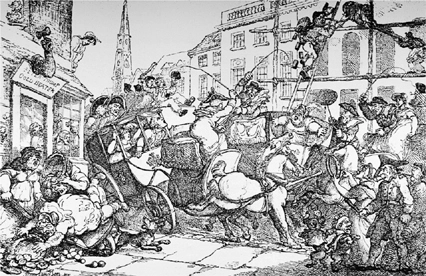They are very often amazingly impertinent if you do not treat them with spirit,26 and make them keep their distance.”
“Are they?—Well, I never observed that. They always behave very well to me.”
“Oh! they give themselves such airs. They are the most conceited creatures in the world, and think themselves of so much importance!—By the bye, though I have thought of it a hundred times, I have always forgot to ask you what is your favourite complexion in a man. Do you like them best dark or fair?”
“I hardly know. I never much thought about it. Something between both, I think. Brown—not fair, and not very dark.”
“Very well, Catherine. That is exactly he. I have not forgot your description of Mr. Tilney;—‘a brown skin, with dark eyes, and rather dark hair.’—Well, my taste is different. I prefer light eyes, and as to complexion—do you know—I like a sallow better than any other.27 You must not betray me, if you should ever meet with one of your acquaintance answering that description.”
“Betray you!—What do you mean?”
“Nay, do not distress me. I believe I have said too much. Let us drop the subject.”
Catherine, in some amazement, complied; and after remaining a few moments silent,28 was on the point of reverting to what interested her at that time rather more than any thing else in the world, Laurentina’s skeleton; when her friend prevented her, by saying,—“For Heaven’s sake! let us move away from this end of the room. Do you know, there are two odious young men who have been staring at me this half hour. They really put me quite out of countenance.29 Let us go and look at the arrivals. They will hardly follow us there.”
Away they walked to the book;30 and while Isabella examined the names, it was Catherine’s employment to watch the proceedings of these alarming young men.
“They are not coming this way, are they? I hope they are not so impertinent as to follow us. Pray let me know if they are coming. I am determined I will not look up.”
In a few moments Catherine, with unaffected pleasure, assured her that she need not be longer uneasy, as the gentlemen had just left the Pump-room.
“And which way are they gone?” said Isabella, turning hastily round. “One was a very good-looking young man.”
“They went towards the churchyard.”31
“Well, I am amazingly glad I have got rid of them! And now, what say you to going to Edgar’s Buildings with me, and looking at my new hat? You said you should like to see it.”
Catherine readily agreed. “Only,” she added, “perhaps we may overtake the two young men.”32
“Oh! never mind that. If we make haste, we shall pass by them presently, and I am dying to shew you my hat.”
“But if we only wait a few minutes, there will be no danger of our seeing them at all.”
“I shall not pay them any such compliment, I assure you. I have no notion of treating men with such respect. That is the way to spoil them.”
Catherine had nothing to oppose against such reasoning; and therefore, to shew the independence of Miss Thorpe, and her resolution of humbling the sex, they set off immediately as fast as they could walk, in pursuit of the two young men.

The Pump Room (the street lamps are from a later period). The main entrance, beneath the pediment and partly blocked from view by the covered walkway, faces north. Catherine and Isabella would have walked through the space in front of the entrance until reaching the archway (see this illustration), which is positioned to the left of the picture. The White Hart Inn was located at the approximate spot where the picture was taken.
[From Mowbray Aston Green, The Eighteenth Century Architecture of Bath (Bath, 1904), p. 196]
[List of Illustrations]
Chapter Seven
Half a minute conducted them through the Pump-yard to the archway, opposite Union-passage;1 but here they were stopped. Every body acquainted with Bath may remember the difficulties of crossing Cheap-street at this point;2 it is indeed a street of so impertinent a nature, so unfortunately connected with the great London and Oxford roads, and the principal inn of the city,3 that a day never passes in which parties of ladies, however important their business, whether in quest of pastry, millinery,4 or even (as in the present case) of young men, are not detained on one side or other by carriages, horsemen, or carts.5 This evil6 had been felt and lamented, at least three times a day, by Isabella since her residence in Bath; and she was now fated to feel and lament it once more, for at the very moment of coming opposite to Union-passage, and within view of the two gentlemen who were proceeding through the crowds, and threading the gutters of that interesting7 alley, they were prevented crossing by the approach of a gig,8 driven along on bad pavement by a most knowing-looking coachman9 with all the vehemence that could most fitly endanger the lives of himself, his companion, and his horse.

A chaotic street scene (from London), such as Catherine and Isabella are encountering.
[From Joseph Grego, Rowlandson the Caricaturist, Vol. II (London, 1880), p. 65]
[List of Illustrations]
“Oh, these odious gigs!” said Isabella, looking up, “how I detest them.” But this detestation, though so just, was of short duration, for she looked again and exclaimed, “Delightful! Mr.
1 comment